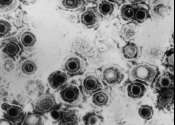Study reveals how a Rab protein controls HIV-1 replication
HIV-1 replication requires the coordinated movement of the virus's components toward the plasma membrane of an immune cell, where the virions are assembled and ultimately released. A study in The Journal of Cell Biology reveals ...
May 4, 2015
0
56








